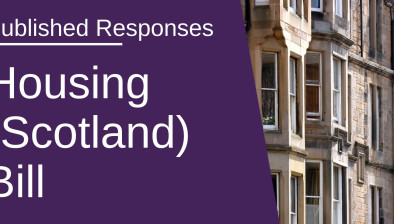Rent controls and new duties at centre of new housing bill

The Scottish Government has published new legislation which aims to keep people in their homes and help prevent homelessness.
The Housing (Scotland) Bill will introduce an ‘ask and act’ duty on social landlords and bodies, such as health boards and the police, to ask about a person’s housing situation and act to avoid them becoming homeless wherever possible.
It also reforms provision for people threatened with homelessness up to six months ahead and includes provisions for tenants experiencing domestic abuse.
The bill will outline proposals for a New Deal for Tenants, a key part of the Bute House Agreement between the Scottish Government and the Scottish Green Party.
Proposals include long-term rent controls for private tenancies, new rights to keep pets and decorate rented homes and stronger protection against eviction.
Housing minister Paul McLennan and tenants’ rights minister Patrick Harvie will lead the bill’s passage through the Scottish Parliament.
Mr McLennan said: “Scotland already has the strongest rights in the UK for people who become homeless – but nobody should have to experience the trauma and disruption of losing their home.
“Early action, through the kinds of measures included in the Housing Bill, results in fewer people reaching the point of housing crisis. It also means people facing homelessness have more choice and control over where they live, helping them to maintain relationships in their community and stay in work.”
Mr Harvie said: “A fairer, well-regulated rented sector is good for both tenants and landlords. Tenants benefit from improved conditions and security, while good responsible landlords will thrive when their good practice is recognised by regulation.
“Scotland has led the way across the UK in improving the experience of people who rent their homes and this reform has been at the same time as significant growth in the size of the private rented sector.
“So progressive reform can lead to better conditions and a healthy rented sector overall. I want to keep working with both tenants and landlords to achieve that goal.”

Callum Chomczuk
CIH Scotland national director Callum Chomczuk said: “The Housing Bill, if appropriately funded, could be an opportunity to drive positive systemic change, with welcome new proposals for victims of domestic abuse and those at risk of homelessness. Although we have real concerns about the impact a rent control policy will have on the supply of privately rented homes.
“However, no matter how welcome any policies are, any legislation will take years to come into effect and with Scotland in the midst of a housing emergency we are concerned that this Bill doesn’t address the structural changes required in our housing system today.
“Statistics published (this week) show that the building of approvals and new starts of social housing are at their lowest levels in over 10 years. This is compounded by the almost £200m cut in the affordable housing budget which come into effect next week.
“It is clearer than ever that Scotland needs a housing emergency action plan and money front-loaded for a social house building programme. Only by building more social homes can we hope to address the housing emergency.”
Shelter Scotland criticised the new bill saying it fails to address the systemic issues driving the housing emergency.
The charity warned that there was no realistic prospect of councils being able to fulfil new statutory obligations given that local authorities are regularly failing to meet their existing legal duties.
The bill’s publication comes in the wake of figures which show a significant decline in the delivery of social homes, which Shelter Scotland says is essential in tackling the systemic issues driving the housing emergency.

Alison Watson
Shelter Scotland director, Alison Watson, said: “There is a growing consensus that Scotland is in the grip of a housing emergency. Already four local authorities have declared housing emergencies, with more expected to follow in the coming weeks.
“Today’s housing bill was an opportunity to address the causes of that emergency and end the scandal of 10,000 children trapped in temporary accommodation.
“What we need is urgent action to drive up the supply of social homes, investment in local services and stop to councils breaking existing homelessness laws.
“Instead, we have a housing bill that does none of that and risks diverting frontline staff from the task in hand. By proposing new additional duties on councils already failing to deliver existing laws, we run the risk of making the situation worse.
“It is time for Scottish Ministers to listen to what our communities are telling them – declare a housing emergency and bring forward a new plan to deliver the social homes we need.”
Cyrenians welcomed long-awaited new prevention or ‘Ask and Act’ duties that have the power to reach people before they become homeless and get them the right help, much faster.
‘Ask and act’ forms the cornerstone of a wider set of reforms to homelessness legislation. If passed, the Bill will require public bodies – including healthcare and justice agencies - to implement systems whereby people at risk of homelessness are easily identified and directed to the appropriate services before they reach crisis point.
These duties will implement recommendations from the Homelessness Prevention Task and Finish Group (co-chaired by Crisis and Cyrenians), published in August 2023. The group drew on its collective knowledge of the housing sector, as well as the lived experience of people who were homeless, through the All in for Change programme.
Throughout the process, building up to the publication of the Housing Bill, Cyrenians has consistently argued for increased funding to resource new prevention duties. The charity said it will continue to advocate for the necessary resources that public bodies and local authorities will need to make the promise of the Housing Bill possible.

Ewan Aitken
Ewan Aitken, chief executive of Cyrenians, said: “Scotland is in the grip of a housing crisis. Several local authorities have now formally declared a housing emergency as the numbers of people facing homelessness is reaching record levels. But we know from our work across 60 services in Edinburgh, the Borders, Falkirk and the Lothians, that in many cases homelessness can be stopped long before people reach crisis point. To do that we need to ensure that everyone has the opportunity to tackle homelessness, giving people within public bodies the right training and resource to be able to fulfil this role. We believe that this, a public health approach to homelessness, is key to tackling the housing crisis.
“We are very pleased to see the plans for prevention duties within the Housing Bill, published today. This legislation has the potential to prevent homelessness in Scotland. However, to do that, it needs to be properly resourced. As a charity which tackles the causes and consequences of homelessness, we regularly work with people whose situation could have been prevented, if they had received help earlier. We urge the Scottish Government to ensure that these duties are properly funded so that the Housing Bill can live up to its potential.”
Living Rent’s secretary, Aditi Jehangir, said: “In the middle of a housing crisis, where renters across the country are being pushed to the edge by unaffordable rents, this bill is a huge step forward for tenants. It includes key measures that we have been fighting for such as rent controls that apply between tenancy, the ability to cap increases at 0%, rights for joint tenants to leave and the right to have pets and redecorate.
“If passed, these will have a huge impact on tenants’ lives, ensuring that we have homes that we can actually call ours. But we know the landlord lobby will try to water down the bill at every step. Our representatives need to stand up for tenants and bring in robust rent controls that both improve housing quality and ensure homes in Scotland are affordable.”
Ben Twomey, chief executive of Generation Rent, added: “Rent regulation in Scotland is here to stay and we welcome the Scottish Government’s decision to introduce a permanent Rent Controls Framework. Scotland continues to lead the UK in protecting tenants from unfair and unaffordable rent rises, and this Bill is evidence of what renter campaigns can achieve, with Living Rent deserving a lot of credit.
“The proposed system has the potential to improve the tenant experience in Scotland but it needs to be designed well, so it can be implemented and enforced effectively. As it stands the local nature of the regulation could lead to tenants outside of rent control areas facing unaffordable rent increases.
“It will also take some time for the changes to come into force, with local assessments and consultations needed even after the Bill becomes law. In the meantime, tenants face rent increases of up to 12% even with the interim protections.
“Nevertheless, alongside new rights around pets and decoration, this is another positive step forward for renters in Scotland, and we look forward to working with the Scottish Parliament to make the Bill as strong as possible.”
The new Housing Bill will “compound the mistakes” the Scottish Government has already made with the private rented sector, Scottish Land & Estates has said.
The rural business organisation said the significant recent decrease in homes available to rent in rural areas was likely to be worsened by the new legislation.

Anna Gardiner
Anna Gardiner, policy adviser (rural property) at Scottish Land & Estates, said: “The Scottish Government had an opportunity to work with both landlords and tenants to attempt to return confidence to the private rented sector - and thereby improve how things work for both groups.
“Instead, the new legislation appears to compound the mistakes that have led to a crash in the number of properties available to rent in rural areas, and tenants being unable to find accommodation to suit their needs. The lack of available housing, particularly in the rented sector, is a key driver of rural depopulation.
“This bill provided an opportunity to tackle this, but instead, the Scottish Government has chosen, once again, to force failed solutions to urban problems on rural communities, with no thought for the consequences. We are pleased, however, to see our ask for decisions to be evidence-driven and based on data appears to have been taken on board.
“The new bill also appears to further complicate the eviction process. Good tenants are valued by landlords and tenants are seldom asked to leave a property without good reason. However, by the government skewing the balance of rights even further in favour of tenants, it will bring anxiety to landlords about their ability to regain vacant possession if required.
“Most importantly, the bill does nothing to encourage the building of new homes at a time when the government’s own data underlines how few homes are being built.
“This is the first draft of the legislation and we hope that Ministers will work with us and others in the sector to address some of the potential negative outcomes. There is a real opportunity for government to ensure a well-functioning private residential tenancy for rural areas and we would be pleased to meet and enter into dialogue towards achieving this.
“At a time when there is a housing crisis, and a shortage of homes to rent, we need a Bill that will deliver substantial progress in alleviating the problems that exist and we hope government will work constructively towards that.”

John Blackwood
John Blackwood, chief executive of the Scottish Association of Landlords, added: “Despite the hype and promises from the Scottish Government, it seems these proposals will do nothing to help either tenants or landlords in the private rented sector.
“The rent control proposals, as has been seen in places like Ireland which has similar measures, will see reduced investment and more landlords leaving the sector, leading to higher costs for tenants.
“The effects of Scottish Government policies in the PRS are already being felt, with rising costs reducing supply and placing more pressure on council and housing association properties that they are struggling to cope with.
“As landlords have said for a number of years, what is needed is a coordinated plan to build more social housing, encourage more investment in private renting and the building of more owner-occupied homes.
“The approach outlined in this legislation will exacerbate Scotland’s housing crisis and make it harder for people to have the quality home they deserve, in a place they want and at a price they can afford.”

Timothy Douglas
Timothy Douglas, head of policy and campaigns at Propertymark, said: “The Scottish Government’s continued quest for rent control and restrictions on rent increases are laid bare in the Housing (Scotland) Bill. The measures will do nothing but add extra burden on landlords and local authorities with no additional reward for tenants at a time when resources and finances are under extreme pressure.
“More practical rules and timeframes are needed around changes to let property and requests for pets as well as notice periods for departing joint tenants. Fundamentally, though, the long-term aim for the Scottish Government must be to re-balance supply and demand levels for private rented property. A review of all recent tax changes that impact private landlords is urgently needed and must form part of these reforms.”
Scottish Property Federation director David Melhuish said: “The Housing Bill comes just 24 hours after the Scottish Government released statistics showing a significant fall in new home starts across all tenures. Every effort must be made to address the supply crisis in Scotland by building more homes of all tenures. There is no solution to the housing crisis that does not involve greatly increasing the supply of new homes across for sale and rent.

David Melhuish
“This bill will be a disappointment to those seeking to build new rental homes in Scotland. Investors in the new, modern Build-to-Rent sector - which brings high standards of property management and offers greater flexibility to tenants, in line with many of the Government’s objectives - will remain uncertain of what the future rent control system will look like until potentially late 2026.
“Investors will also be greatly concerned to see rent controls extended to properties that go back onto the market after a sitting tenant has left. This could make it harder for property owners to fund major improvements, including energy efficiency measures, to their properties between tenancies.
“Should the legislation be approved by the Scottish Parliament unamended, we risk repeating the damaging effects of the emergency rent freeze legislation passed in 2022 when investment for Scottish rental housing was frozen, deterred, or diverted to projects outside of Scotland. We estimate that there is currently between £2.5bn and £3bn of investment now at risk that could deliver quality new homes for rent in Scotland.
“Our industry and members remain committed to supporting new investment into the sector and will engage with the scrutiny process of the Bill as it progresses through the Scottish Parliament.”
Claire Wilson-Leary, public affairs manager at Dogs Trust, said: “We welcome proposals within the Housing (Scotland) Bill that, if passed, will mean landlords cannot unreasonably refuse consent for private tenants to keep a pet. We have long called for stronger rights for responsible dog-owning tenants to be able to keep a pet.
“We will be engaging with the Scottish Government to clarify details of when it would be reasonable for landlords to refuse consent to ensure that tenants are not unjustly denied the right to keep a pet.
“We are also pleased to see that the Bill includes provisions to support social housing tenants who are experiencing domestic abuse. Through Freedom, we support dog owners experiencing domestic abuse, and we will continue to advocate for them so that tenants fleeing domestic abuse are also considered.”









